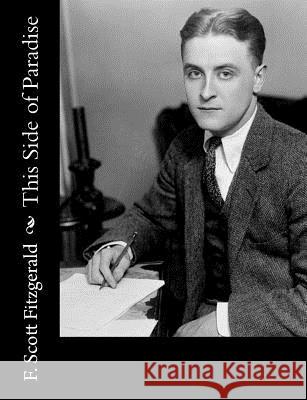This Side of Paradise » książka
This Side of Paradise
ISBN-13: 9781500579333 / Angielski / Miękka / 2014 / 256 str.
This Side of Paradise
ISBN-13: 9781500579333 / Angielski / Miękka / 2014 / 256 str.
(netto: 49,37 VAT: 5%)
Najniższa cena z 30 dni: 51,12
ok. 16-18 dni roboczych.
Darmowa dostawa!
This Side of Paradise is the debut novel of F. Scott Fitzgerald. Published in 1920, and taking its title from a line of the Rupert Brooke poem Tiare Tahiti, the book examines the lives and morality of post-World War I youth. Its protagonist, Amory Blaine, is an attractive Princeton University student who dabbles in literature. The novel explores the theme of love warped by greed and status-seeking.
Background
In the summer of 1919, after less than a year of courtship, Zelda Sayre broke up with the 22-year-old Fitzgerald. After a summer of heavy alcohol use, he returned to St. Paul, Minnesota where his family lived, to complete the novel, hoping that if he became a successful novelist he could win Zelda back. While at Princeton, Fitzgerald had written an unpublished novel called The Romantic Egotist and ultimately 80 pages of the typescript of this earlier work ended up in This Side of Paradise.
On September 4, 1919, Fitzgerald gave the manuscript to a friend to deliver to Maxwell Perkins, an editor at Charles Scribner's Sons in New York. The book was nearly rejected by the editors at Scribners, but Perkins insisted, and on September 16 it was officially accepted. Fitzgerald begged for early publication-convinced that he would become a celebrity and impress Zelda-but was told that the novel would have to wait until the spring. Nevertheless, upon the acceptance of his novel for publication he went and visited Zelda and they resumed their courtship. His success imminent, she agreed to marry him.
Style
This Side of Paradise blends different styles of writing: at times a fictional narrative, at times free verse, sometimes narrative drama, interspersed with letters and poems from Amory. In fact the novel's odd blend of styles was the result of Fitzgerald cobbling his earlier attempt at a novel The Romantic Egotist together with assorted short stories and poems that he composed, but never published. The occasional switch from third person to second person gives the hint that the story is semi-autobiographic.
Critical reception
The book's critical success was driven in part by the enthusiasm of reviewers. Burton Rascoe of the Chicago Tribune wrote that "it bears the impress, it seems to me, of genius. It is the only adequate study that we have had of the contemporary American in adolescence and young manhood." H. L. Mencken wrote that This Side of Paradise was the "best American novel that I have seen of late."
Zawartość książki może nie spełniać oczekiwań – reklamacje nie obejmują treści, która mogła nie być redakcyjnie ani merytorycznie opracowana.











